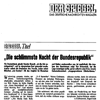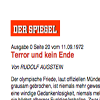National Content: Germany
"Die schlimmste Nacht der Bundesrepublik Deutschland" "The worst night of the German Republic“
English summary of the article
„The worst night of the German Republic“
The article analyzes the domestic and external circumstances that existed in Germany before and after the terror attack that occurred during the 1972 Munich Summer Olympic games.
The author illustrates that the international community’s expectations heading into the 1972 Munich Summer Olympic games were high. He states that after the Vietnam war, Mao in China and the Middle East-Conflict, the international community yearned for an arena of peace to mark the beginning of an era of peace. He makes clear that the catastrophe in Munich destroyed that peaceful climate. He reports that after the terror attack, Israeli bombs flew further into Syrian territory than ever before; that Jewish extremists requested the murder of Arabian diplomats; that the Arabs, formally ready for a compromise, regressed from that standpoint and supported the Palestinians again. The author explains that the terror attack which occurred during the Olympic Games demonstrated that open warfare cannot be isolated and that terror and war cannot be domestically contained. He agrees that the utopian ideal of the Olympics was shattered, resulting in the dimming of the international community’s once lofty hopes. But the author questions if suppressed realities had to be eventually revisited in any case.
The author highlights that the terror attack, irrespective of geopolitical considerations, forced Germany to examine domestic problems, as the Munich Games were an attempt to come to come to terms with the burden of its past. He recounts Germany’s transgressions of traditional self-pity as a result of the terror attacks. As Israel’s refusal to negotiate with the terrorists, limited the scope of the German Police’s possible actions, making it nearly unavoidable from an operational perspective to guarantee the hostage’s safe rescue. The author feels that thus the “it-was-not-our-fault” attitude arose again.
The author also criticises the behaviour of German politicians during the crisis. He reports that, when it looked like a happy-end was in sight, German politicians showed up without being asked, wherever media would be found. The author states that nobody wanted to be responsible after the hostages got killed. The author emphasized the humiliating behaviour of German politicians by stating that the terror attack was after the fact, misused for political gains and electoral campaigns.
Finally, the author comes to the conclusion that the Munich terror attacks resulted in both external and domestic consequences.
“Terror without an end” - "Terror ohne Ende"
A political commentary in the most important German weekly magazine DER SPIEGEL.

